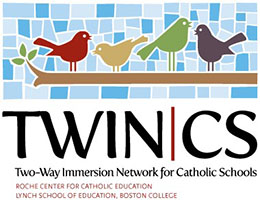 CHESTNUT HILL, Mass. • The Barbara and Patrick Roche Center for Catholic Education hosted more than 120 Catholic school teachers and administrators June 18-22 for the annual Summer Academy of the Two-Way Immersion Network for Catholic Schools (TWIN-CS).
CHESTNUT HILL, Mass. • The Barbara and Patrick Roche Center for Catholic Education hosted more than 120 Catholic school teachers and administrators June 18-22 for the annual Summer Academy of the Two-Way Immersion Network for Catholic Schools (TWIN-CS).
Two schools from the Archdiocese of San Antonio, St. Leo the Great Catholic School and St. Mary Magdalen Catholic School, were represented by five and four staff members respectively who all participated in a variety of workshops, activities, and seminars in which they acquired new knowledge of two-way immersion methodologies and assessments, collaborated with peers from across the nation, and grew in their understanding of the mission of Catholic education.
Overall, 18 Catholic elementary and middle schools from nine states participated in the week-long event.
In its fifth year, TWIN-CS has garnered nationwide attention for its pioneering and transformative work in bilingual and bi-literate Catholic education. In 2012, twelve schools comprised the network. Today, TWIN-CS features 18 full member schools and an additional eight “study schools,” who are in a process of discernment and planning for whole school change from their monolingual curriculum to a two-way immersion educational model. Member schools serve populations of which at least one-third speak the same non-English language, and implement curriculum in Spanish or Mandarin and English. One of the 36 entrepreneurial elementary schools features all three languages.
The network strives to “return schools to their original mission: to serve all who seek a Catholic education, especially those on the margins, and embrace cultural and linguistic diversity,” said Kristin Melley, the Roche Center’s director of Professional Development and lead member of the TWIN-CS design team. The team also features experts in assessment, applied psychology, literacy development, and school leadership from Boston College’s Lynch School of Education and other universities, who present and consult with schools at the academy and act as advisors throughout the academic year.
Boston College’s Jesuit mission of faith and service and its historical roots as a school for Boston’s Irish Catholic immigrant population undergird the college’s commitment to supporting TWIN-CS. Catholics are more likely than other Americans to be immigrants or the children of immigrants, according to Pew Research Center reports, and 60 percent of school-age Catholics in the United States are Hispanic. “These young Catholics are the future of the church,” said Patricia A. Weitzel-O’Neill, executive director of the Roche Center and co-author with Dr. Hosffman Ospino of the 2016 Catholic Schools in an Increasingly Hispanic Church report, “Catholic schools are called to serve these future leaders.”
Five years into the initiative, the 2017 Summer Academy included a focus on resilience. The pioneering work of the Roche Center and network schools has not been without challenges, including community pushback, linguistic asymmetry, sociocultural integration issues, and the implementation of unfamiliar curriculum and assessments. Successful member schools have a demonstrated commitment to two-way immersion, and have cultivated community support to sustain systemic change in the school. The maturing schools’ sustained success has led to a new classification: advanced member schools are largely self-sustaining, which allows the design team to concentrate formal resources on newer members. Both advanced and beginning member schools share strategies with one another, managing the challenges of change with the support of the community that TWIN-CS provides. The network provides an alternative learning platform for these schools to innovate, implement, depend on each other, and deepen their Catholic Identity as they break barriers in their diocese.
“The academy is a unique opportunity for Catholic schools implementing bilingual education,” Melley says. “Its uncommon work, so dioceses often don’t have the resources to organize local professional development in the field. Boston College has the resources to support these schools and facilitate the collaboration that makes TWIN-CS so powerful. The network grows directly from our mission to invigorate Catholic education with a preferential option for the poor and marginalized.”


